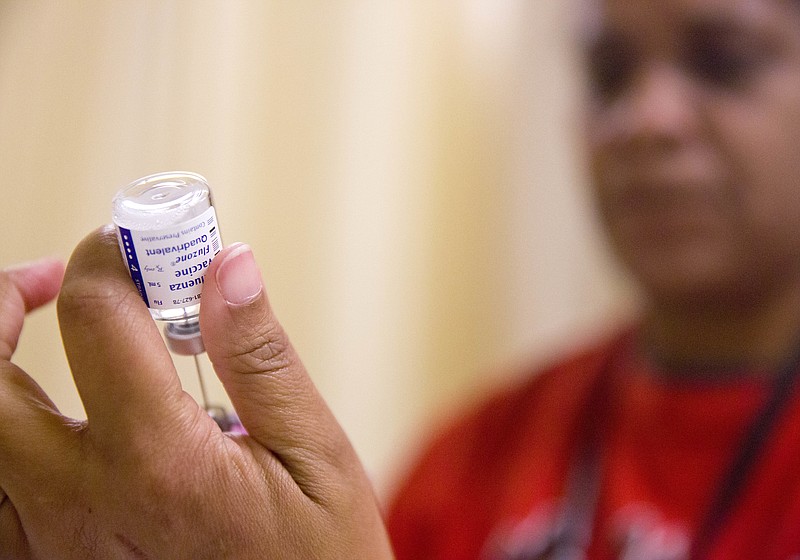FAST FACTS ABOUT HEP A
Symptoms may include fever, headache, fatigue, low appetite, stomach pain, nausea, vomiting, dark urine or jaundice. If persons, family or friends are experiencing any of these symptoms, they should contact their healthcare provider as soon as possible.To reduce the spread of hepatitis A:› Get vaccinated as soon as possible› Do not share drug paraphernalia, cigarettes, food, drinks, eating utensils, towels or toothbrushes› And, wash your hands frequently:* Before, during, and after preparing food* After using the toilet* After changing diapers or cleaning up after a person who has used the toilet* After touching garbage* Before eating food* Before and after caring for someone who is sickSource: Alabama Department of Public Health
An outbreak of hepatitis A in five Northeast Alabama counties - now nearing three dozen cases in DeKalb and Jackson counties alone - has forced officials to craft a response plan and call for people to get vaccinated.
Sand Mountain in Jackson and DeKalb is a hotspot for the outbreak, officials said, and certain populations there and elsewhere are the target of vaccination and education efforts.
Alabama Department of Public Health records through April 10 show 26 cases reported in Jackson County and 19 reported in DeKalb County since Sept. 1, 2018. Non-outbreak counties include neighboring Marshall, Etowah and Cherokee each with one reported case during the period. Two more southerly counties - Jefferson and Montgomery - are on Alabama's hepatitis A map, too, with one case each, records show.
Hepatitis A is a contagious liver infection caused by a virus that occurs only as a new infection and does not become chronic. Symptoms include nausea, fatigue, fever, stomach pains, diarrhea, jaundice, dark urine and light-colored feces. There is no cure, but symptoms can be treated, health officials.
Jackson County Emergency Management Agency deputy director Paul Smith said Wednesday the outbreak is appearing among "people in communal living, drugs users and people who engage in high-risk sexual contact."
On May 9, Jackson County EMA and health officials will announce a response plan for remote vaccination clinics in those high-risk areas, Smith said. High-risk folks can be hesitant to seek help, so officials hope to get more of them vaccinated by going directly to those communities, he said.
Dr. Karen Landers, public health department medical officer and medical consultant for tuberculosis control and immunization, said Alabama is applying lessons learned in states like Tennessee, Arkansas, California and Michigan.
WHO SHOULD GET VACCINATED?
For people age 1 and older, there are two vaccines that protect against hepatitis A. Two doses are given, at least six months apart. For people 18 and older, there is one combination vaccine that protects against hepatitis A and B. Three doses are needed. Those who should be vaccinated include:› All children at age 1› Persons at increased risk for complications from hepatits A› Persons wishing to be protected› Anyone who is at increased risk for infection, including those who have:* Chronic liver disease* Clotting factor disorders* Used street drugs-been homeless or in transient living* Had direct contact with someone with hepatitis A* Traveled outside of the U.S.* A man who has sex with menSource: Alabama Department of Public Health
Vaccinations have been given to inmates in local jails and anyone who is arrested to help prevent the spread of the disease, Landers said. Those efforts are being boosted by additional efforts of local physicians and pharmacies who are urging people get vaccinated.
Likewise, vaccines are being given to people who come into Northeast Alabama emergency rooms, she said.
Across the state line, Georgia health officials in late March confirmed a case of hepatitis A in a food handler at a Chickamauga restaurant and had previously confirmed a case in a food handler at a Dalton-area restaurant. In Tennessee, Hamilton County health officials confirmed a case at an Ooltewah-area restaurant, also in March. In 2018, there were two deaths and more than 500 cases, including 55 in Hamilton County, in Tennessee. Records show there have been 148 reported cases in Hamilton County since May 2018, accompanied by increased vaccination efforts.
Alabama health records show the number of adults getting vaccinations has jumped by more than 10,000% since last year.
Between December 2017 and April 2018, six people got vaccinated in Jackson County and 11 got their shots in DeKalb. Between December 2018 and April this year, vaccines were given to 552 people in Jackson County and 1,194 people in DeKalb County.
Landers said everyone in the region should be on alert and remember that good hygiene is a key to preventing spread of the disease.
Contact staff writer Ben Benton at bbenton@timesfreepress.com or 423-757-6569. Follow him on Twitter @BenBenton or at www.facebook.com/benbenton1.
